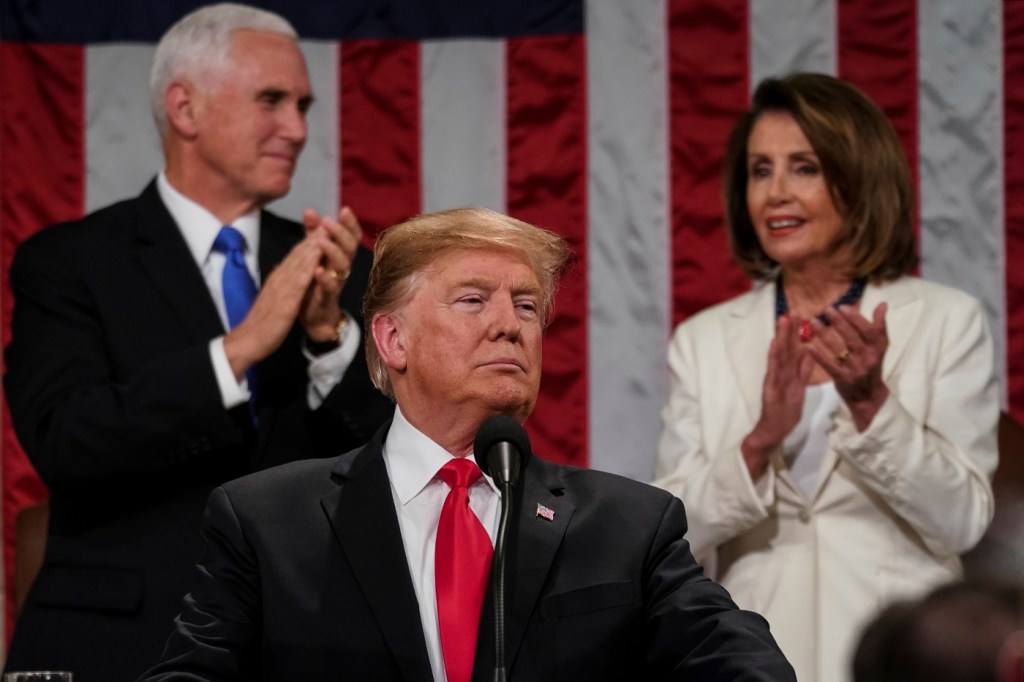At the State of the Union, Trump makes his pitch for the border in the language of unity

President Donald Trump kicked off a State of the Union address delayed by an unprecedented government shutdown by championing policies that “the Democrats would have no choice but to applaud,” said Nicholas Beauchamp, an assistant professor of political science at Northeastern University.
The president, faced with a standoff over border security and with a deadline for a second partial government shutdown, told members of the 116th Congress Tuesday that “The state of the Union is strong.”
Trump bookended his pitch for a wall at the country’s southern border—a centerpiece of his domestic agenda—with conciliatory language that could be a signal for those searching for it that he’s “pivoting to something more centrist,” Beauchamp said.
The address revealed “a president who might do better if he adopted a more conciliatory tone, and he’s showing that he can,” Beauchamp said. “Whether he will is what we’ll have to wait and see.”
Beauchamp, who specializes in quantitative text analysis, tracked the sentiment of Trump’s address. He gave each sentence a net positive or negative tone, based on the percentage of positive and negative words in that sentence, then plotted those sentences over time.

Nicholas Beauchamp, assistant professor of political science, mapped the sentiment of President Donald Trump’s State of the Union address delivered on Tuesday, Feb. 5, 2019.
“As you can see, the beginning and end of the speech are strongly positive, with more negative language in the middle, especially the big negative surge towards the end when he talks about war,” Beauchamp said.
In the beginning and end of his address, Trump injected mention of policies for which both Democrats and Republicans could cheer.
One such moment arrived when Trump praised the empowerment of women brought on by the country’s economic upturn.
“No one has benefited more from our thriving economy than women, who have filled 58 percent of the newly created jobs last year,” Trump said. At the mention, congresswomen, many of whom were dressed in white in homage to the suffragette movement, stood up and cheered.
Reacting to the response, Trump teased his next line, saying, “Don’t sit yet, you’re going to like this,” adding, “Exactly one century after Congress passed the constitutional amendment giving women the right to vote, we also have more women serving in Congress than at any time before.” (There are 127 women serving in the 116th Congress.)
“Who can complain about decreasing unemployment, or deny the celebration of a World War II veteran?” he said.
Trump neatly avoided both the biggest threat to his presidency and the most intractable sticking point between Democrats and Republicans during his address.
Instead, when Trump did mention special counsel Robert Mueller’s investigation into possible collusion between Russians and his 2016 campaign, he again invoked a message of unity.
“If there is going to be peace and legislation, there cannot be war and investigation; it just doesn’t work that way,” the president said.
“Given how many really big issues are looming,” Beauchamp said, “it was striking not to hear about them.” Among those big issues, he said, was the potential for another government shutdown.
A 35-day partial government shutdown over Trump’s proposed wall along the southern border ended in January, when the president approved a spending package that would fund the government through Feb. 15. With that date quickly approaching, Trump made an impassioned case during his address for Democrats to approve a border security deal that includes $5.7 billion for a wall. Without that funding, Trump has said he would consider declaring a national emergency in order to secure the funding.
“Simply put, walls work and walls save lives,” Trump said Tuesday.
Beauchamp said: “What’s going to happen in the next 10 days is the most pressing question.”
For media inquiries, please contact media@northeastern.edu.





